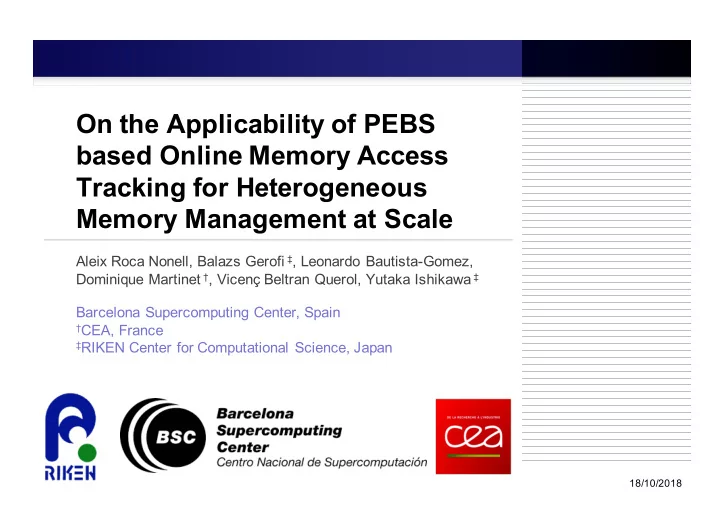

On the Applicability of PEBS based Online Memory Access Tracking for Heterogeneous Memory Management at Scale Aleix Roca Nonell, Balazs Gerofi ‡ , Leonardo Bautista-Gomez, Dominique Martinet † , Vicenç Beltran Querol, Yutaka Ishikawa ‡ Barcelona Supercomputing Center, Spain † CEA, France ‡ RIKEN Center for Computational Science, Japan 18/10/2018
Agenda • Motivation • Background – Lightweight Multi-Kernel OS – Processor/precise Event-Based Sampling (PEBS) • Design • Results • Future Work • Conclusions MCHPC @ SC'18, Dallas, TX, USA
Motivation • Heterogeneous memories are here: HBM, MCDRAM, PCM, ReRAM, 3DXPoint, etc. • Heterogeneous memory management alternatives: – Application level – Runtime level – Operating system level • Operating system and/or runtime level – Application-transparent memory management eliminates complexity – Increased productivity/performance • Need for low-cost real-time memory access tracking • Is Processor Event based Sampling (PEBS) feasible when running on large-scale? – What are the trade-offs? MCHPC @ SC'18, Dallas, TX, USA
Objectives of this Paper • Implement a custom PEBS driver in an LWK with the ability of fine-tuning its parameters – LWK provides a clean baseline to asses PEBS’ overhead – Also due to Linux driver’s limitations and instability • Evaluate PEBS overhead on a number of real HPC applications running at large-scale • Demonstrate captured memory access patterns as a function of different PEBS parameters • Analysis of PEBS overhead • We are not using the data to manage heterogeneous memory systems (yet) MCHPC @ SC'18, Dallas, TX, USA
Background: Lightweight Multi-Kernel OS • IHK/McKernel: – Runs Linux and a lightweight kernel (i.e., McKernel) side-by-side on compute nodes – Interface for Heterogeneous Kernels (IHK) provides dynamic re-configurability of host resources – Management of LWK instances – McKernel is an LWK tailored for extreme-scale supercomputing (part of Post-K project) – Goal is to provide LWK scalability and full Linux/POSIX compatibility • Merits for OS level memory management: – Simple LWK codebase allows rapid experimentation with specialized kernel features – Transparent usage of idle CPU cores for background data movement – Full control over HW resources – Ability to specialize drivers (e.g., PEBS) MCHPC @ SC'18, Dallas, TX, USA
Background: Processor Event-Based Sampling (PEBS) Extension to performance counters PEBS reset: controls the sampling frequency PEBS buffer size: indirectly controls IRQ frequency PEBS records RAX RAX RAX RBX RBX RBX . . . … … … Vaddr Vaddr Vaddr PEBS buffer (PEBS s size) Sample every PEBS r access IRQ MCHPC @ SC'18, Dallas, TX, USA
PEBS Linux shortcomings Extension to performance counters PEBS reset: controls the sampling frequency Inability to control PEBS buffer size: indirectly controls IRQ frequency PEBS buffer size.. (fixed to 4kB) PEBS records Low PEBS reset RAX RAX RAX value crashes the RBX RBX RBX . . . Linux kernel.. … … … Vaddr Vaddr Vaddr PEBS buffer (PEBS s size) Sample every PEBS r access IRQ MCHPC @ SC'18, Dallas, TX, USA
PEBS Interrupt Rate Parameters • Our focus is on PEBS interrupt rate • Applications running at scale may suffer from noise introduced by asynchronous events such as IRQs • PEBS’ interference is affected by the following parameters: – Reset counter value: Event sample rate controls frequency on which PEBS records are written into the PEBS buffer – Buffer size: In-Memory buffer size (where PEBS records are stored) controls IRQ rate MCHPC @ SC'18, Dallas, TX, USA
Design: Overview McKernel provides a simple rapid- PEBS provides a configurable low- prototyping OS environment with low overhead mechanism to track memory OS noise when compared to Linux accesses at runtime McKernel + PEBS: groundwork for user- transparent heterogeneous memory management MCHPC @ SC'18, Dallas, TX, USA
Design: McKernel + PEBS Architecture MCHPC @ SC'18, Dallas, TX, USA
Evaluation: Oakforest-PACS • 8k Intel Xeon Phi (Knights Landing) compute nodes – Intel OmniPath v1 interconnect – Peak performance: ~25 PF • Intel Xeon Phi CPU 7250 model: – 68 CPU cores @ 1.40GHz – 4 HW thread / core • 272 logical OS CPUs altogether – 64 CPU cores used for McKernel, 4 for Linux – 16 GB MCDRAM high-bandwidth memory • Hot-pluggable in BIOS – 96 GB DRAM – Quadrant flat mode MCHPC @ SC'18, Dallas, TX, USA
Results: PEBS overhead at scale @ Oakforest-PACS (OFP) MCHPC @ SC'18, Dallas, TX, USA
Results: PEBS overhead at scale @ Oakforest-PACS (OFP) MCHPC @ SC'18, Dallas, TX, USA
Results: Recorded access patterns for different PEBS reset values MCHPC @ SC'18, Dallas, TX, USA
Results: Elapsed time between PEBS interrupts for MiniFE MCHPC @ SC'18, Dallas, TX, USA
Results: Access histogram per page for MiniFE MCHPC @ SC'18, Dallas, TX, USA
Results: Access histogram per page for MiniFE MCHPC @ SC'18, Dallas, TX, USA
Future Work • Integration with un-core memory access traffic counters • Study the possibility of a dedicated hardware thread to collect PEBS data instead of IRQs • Analyse difference between McKernel and Linux PEBS driver • Use profiled PEBS data for heterogeneous memory management – Machine learning for access prediction, memory placement MCHPC @ SC'18, Dallas, TX, USA
Conclusions • Overheads range between 1% and 10.2% and that can be reduced to 4% by adjusting the recording parameters while still clearly capturing access patterns • McKernel driver achieves more fine-grained sample rates than the Linux driver • PEBS efficiency matches requirements for heterogeneous memory management MCHPC @ SC'18, Dallas, TX, USA
Thank you for your attention! Questions?
Recommend
More recommend